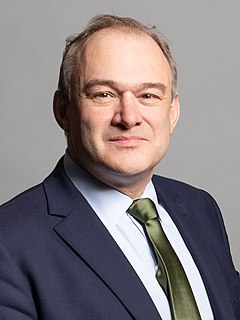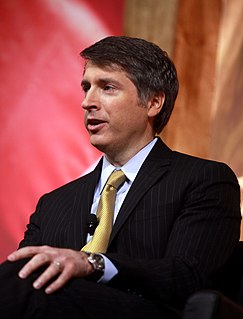A Quote by Katharine Hayhoe
Natural gas is a very flexible source of energy that can help us bridge the gap between our current high-carbon economy and our zero-carbon future.
Related Quotes
The transition from coal, oil, and gas to wind, solar, and geothermal energy is well under way. In the old economy, energy was produced by burning something - oil, coal, or natural gas - leading to the carbon emissions that have come to define our economy. The new energy economy harnesses the energy in wind, the energy coming from the sun, and heat from within the earth itself.
Water is our next great environmental challenge. It is the new oil. How are we going to preserve this sport unless we are designing and maintaining golf courses that are energy net zero, carbon net zero and water net zero? Or ideally, energy positive, carbon positive and water positive, where they are taking out more than they are using.
The horn of dilemma of energy politics is what really drives concern about this energy in this country, at the gut level for most people, is high gas prices. And if you really want to fight global warming and try to reduce our carbon emissions, the cleanest, easiest, most rational way to do it would to make the price of gas even higher through very stiff gas prices.
What I want is natural gas to be a bridge to a cleaner energy future, not a dam against a cleaner energy future, not a dead end. To get this right, to get the most out of it, we not only have to make sure we exploit natural gas in a clean way - it's a challenge - but we also have to make sure that we are instilling and implementing all the incentives to win solar, nuclear energy efficiency that will make them continually competitive with natural gas in the future.
An increased push for energy efficiency, renewable energy technology, electric mobility - along with the growing digitalization movement and a universal carbon pricing structure - would speed up the carbon-free future and the rise of a global middle class we desperately need. We can and must all do our part.
The first thing we can do as individuals and as communities, like a school or a university or a church, is cut our energy use. Do an energy audit or measure our carbon footprint using online carbon calculators that are free, easy, and cheap. Get a list of the ways that we can stop wasting so much energy and save money.
Some time ago we discovered the carbon cycle - a long-term set of chemical reactions that govern climates based on how much carbon is free in the atmosphere. At that point, it became clear that humans were affecting our environments far more profoundly than we realized. By releasing so much carbon and greenhouse gas into the environment, we're making long-term changes to every aspect of the natural world.
To change our national economic story from one of financial speculation to one of future growth, we need a third industrial revolution: a green revolution. It will transform our economy as surely as the shift from iron to steel, from steam to oil. It will lead us toward a low-carbon future, with cleaner energy and greener growth. With an economy that is built to last - on more sustainable, more stable foundations































